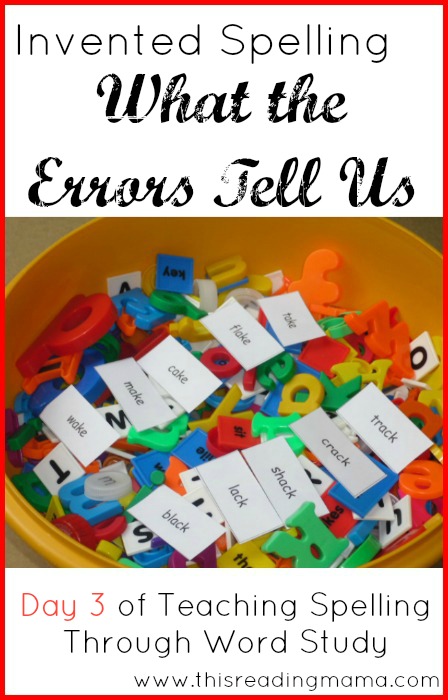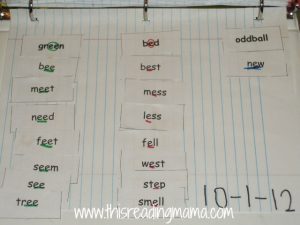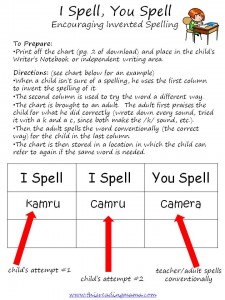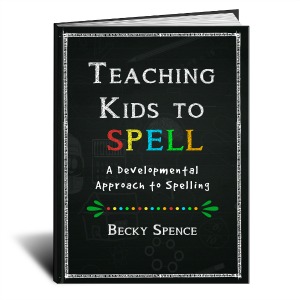 We’re on day 3 of a journey through Word Study. I’m joining 39 other bloggers from iHomeschool Network for 10 Days as we post about all kinds of topics. If you’ve missed the first two posts, feel free to click HERE or on the image above to get caught up. 🙂
We’re on day 3 of a journey through Word Study. I’m joining 39 other bloggers from iHomeschool Network for 10 Days as we post about all kinds of topics. If you’ve missed the first two posts, feel free to click HERE or on the image above to get caught up. 🙂
The question we’ll explore for today: Invented spelling. Also known as phonetic spelling. What exactly is it and what does it have to do with word study?
What Is “Invented Spelling”?
Simply put, invented spelling is when a child (or adult) makes up his own spelling to a word based off of how the word sounds instead of its conventional (or correct) spelling. A prime example of this: BLDOZR for bulldozer. (If you’re looking for a more in-depth definition, Reading Rockets has a great article.)
The Birth of Word Study
I’ve listened to teachers and homeschooling mamas alike claim that invented spelling should be discouraged and only conventional spellings should be accepted. But I would argue that when you ignore or deny that spelling is a developmental progression, you miss out on all kinds of information your young speller could be giving you about the kind of spelling instruction he needs. His misspellings are the very window into his “writing/spelling soul”, not random guesses at a word. In other words, how a child spells/misspells a word gives you the key to unlocking what he does and doesn’t understand about how words work.
Take, for example, the word bullbozer. A very young speller might spell it with only a B or an R. But as he progresses through the stages of spelling, his spelling will mature. B or R will be replaced with spellings such as BDZR, BLDOZR, BULDOZR, and BULDOZER. And this is one of the pillars on which word study was born. “This line of research has documented the convergence of certain kinds of spelling errors that occur in clusters and reflect students’ confusion over certain [spelling patterns].” (Words Their Way)
Teaching on the Child’s Level: At The Heart of Word Study
By taking a glance at a child’s misspellings, we are given clues as to what he does and does not understand about word patterns. Therefore, we are given a big clue as to where instruction needs to take place-his instructional level. I can teach where the child “is at”. (Words Their Way) Challenging, but not so challenging that it frustrates the child.
Let’s go back to our bulldozer example. The child who spells bulldozer with just the B or R is in the mid-Emergent stage (stage 1) and probably would benefit from instruction on letter sounds. The child who spells bulldozer with BDZR is in the early stages of Letter Name-Alphabetic (stage 2) and would benefit from letter sound review, but is more than likely ready for some word family pattern work; which introduces the short vowel sounds.
Invented Spelling: Devil’s Advocate
Now, you might be thinking, “This sounds good and all, but what about conventional spellings? Shouldn’t kids be taught how to spell correctly.” And the answer is a resounding YES!
This quote from How Words Cast Their Spell demonstrates a vital reason spelling is important: “The correlation between spelling and reading comprehension is high because both depend on a common denominator: proficiency with language. The more deeply and thoroughly a student knows a word, the more likely he or she is to recognize it, spell it, define it, and use it appropriately in speech and writing.” Moreover, spelling is a courtesy to the reader and writers need to learn conventional spellings.
One way I encourage this with my own child (currently 7) is by keeping a Word Study Notebook. Word Patterns that we’ve studied go into this notebook. If he misspells a word with a pattern that we’ve already studied, I will look over his writing and say something like, “Oh, look on this page of your notebook. The word you misspelled shares the same pattern as one of the words we studied the other day. What pattern do they share and how can you use that pattern to spell this word correctly?”
Just recently, I also posted a chart (picture above) that you can download and use with your child that encourages invented spelling, but it also provides an opportunity to spell the word conventionally. This chart can be kept in a writing notebook of sorts or in an accessible spot for reference. You can find more information about invented and conventional spellings here.
As you can see, invented spelling is an important factor with word study. Invented spelling has so many good qualities. To view more reasons why I really like it so much, you can click here. Take a glance at this list and feel free to add your own reasons in the comments!
I have also devoted an entire chapter to invented spelling in my ebook, Teaching Kids to Spell: A Developmental Approach to Spelling. You can read more about it or purchase it here.
Enjoy!
~Becky



I love this idea! So many great ideas you have here for reading!
I am loving reading these blogs as I have vacillated between several spelling curricula with my daughters and still have one that feels like it “fits”. Right now, we are doing a combination of AAS and Spelling Workout. I am curiou and a bit confussed however in that so many of your previous blogs, you have advocated Words Their Way and are now introducing the Homeschool Mechanics one. I emailed Ann Cowan and received some sample units to preview, but I’m wondering if you could clarify between these two programs. Are they both spelling programs? How would I choose between them?, etc.
I would appreciate any further guidance!! Thanks so much for your diligent research!!
Bethany Mowad
Hi Bethany, great question! I have always used WTW and was actually trained in Word Study using this book. One of the co-authors was my mentor while earning my M.Ed. in reading. About 6 months ago, I discovered Spelling Mechanics and started asking Ann the same questions you asked me: what is this and how is it the same/different from WTW? She sent me a some samples and I noticed right away that Spelling Mechanics was indeed also a word study program…like WTW. As I’ve done further research for my word study topic, I’ve noticed a few other spelling programs based off of the word study approach. WTW is probably the most well known. I’ll be exploring both programs a little deeper in next week’s posts. But, I can tell you that one of the biggest differences I’ve noted is that WTW is more focused on the school market, while Spelling Mechanics is focused on the homeschool market. Let me know if that makes since and if you have any further questions. 🙂
Thanks Becky. I will look forward to your furhter posts. Is there any way we could I could ask you a few questions that are not in a public setting?? I looked for a place on your blog but didn’t see one.
Love this – would like to have a copy!